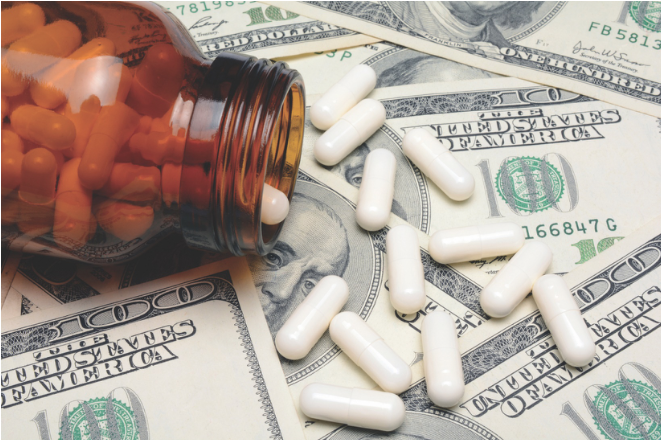CommentsALPERN AT LARGE--The cost of health care can and should remain a high priority for this nation's upcoming election cycle, although those running for higher office too often don't appear to have a grip on how to lower health care costs (and I don't see enough doctors running for positions of power, probably because their calling is too honorable to stoop so low as to be a pandering politician).
But the cost of generic drugs is (at least to this physician) a problem which cries out more than most aspects of health care for resolution. Even older drugs need quality control, marketing, and technological innovation, but when drugs that have been around longer than most of those reading this have been alive are jacked up to unsustainable levels, it's criminal.
Just like selling bottles of water for $20 a bottle during a disaster is against the law.
Economics is inherently more libertarian and laissez faire capitalist than we'd like to admit, but that's where government is meant to step in for the survival of its citizenry:
1) Most of us probably remember Martin "Pharma Bro" Shkreli and hedge fund fraudster who jacked up the cost of the life saving drug Daraprim (used to treat patients with AIDS, malaria, and cancer) from $13.50 to $750 per pill. He went to prison for defrauding his hedge fund investors, and NOT for what he did with his company, Turing Pharmaceuticals.
But guess what? Two-three years later, the cost is STILL $750/pill. Oh yes, Vyera Pharmaceuticals (formerly Turing) will allow the costs to go down to patients who meet certain federal poverty guidelines, and to hospitals (bless Vyera's heart!), but the rape and pillage of cancer and AIDS patients goes on.
2) But Shkreli was and is only the tip of the iceberg, and to some extent we owe him a debt of thanks for being the smiling, smirking, cruel face of a pharmaceutical industry that is miles deep and rotten to the core.
Hector Armando Kellum, who was responsible for overseeing generic-drug prices at Sandoz, a generics unit of Swiss pharmaceutical giant Novartis, pleaded guilty to conspiring with other drug executives to fix prices from 2013 to 2015, according to the U.S. Justice Department.
Sandoz apparently was conspiring with Taro and other companies to fix prices. Mylan and Teva have also been guilty of this price-fixing between competitive companies, and the Antitrust Division of the Department of Justice is hard at work to provide sunshine and, when appropriate, criminal prosecution to address this monopolistic and illegal behavior on behalf of the entire generics industry.
Is it a RICO (Racketeer Influenced and Corrupt Organizations) Act violation?
Maybe.
Is it a form of laissez faire capitalism that BOTH major political parties have addressed appropriately?
Certainly.
Price control measures are potentially a great idea for the United States to do with respect to matching prices in Canada and Europe--effectively, U.S. consumers pay 2-3 times as much for the same drug as do Canadian and European consumers, and just as effectively, we subsidize those nations' consumers.
But so are FDA and Centers for Disease Control recommendations to alter or even end patents that are harming American consumers. Clearly, the need to avoid stifling innovation for new medications must at all costs be avoided...but we're talking the lowest-hanging fruit here.
Generics that are well-beyond their patent expiration have no need to be raised in costs to the extent that most Americans are struggling to pay the costs.
But when Teva, Sun, and other pharmaceuticals are in talks to end the U.S. Justice Department probes, they should be told to go pound sand in the same way these companies have told American consumers to go pound sand.
The nation's specialty societies, such as my own American Academy of Dermatology and Dermatologic Surgery, and certainly the American Medical Association, should open their mouths and demand both the research and proclaim recommended price ranges for key and ideally-cheap medications so that their patients can access and afford them.
And use them without fear of going bankrupt simply because they want to be healthy.
Topical clobetasol, clindamycin, metronidazole, tretinoin, and a host of topical steroids, antifungals, antibiotics and other inexpensive-to-make preparations should not be unaffordable. Neither should generic antibiotics and other medications that are decades-old and dirt-cheap to make by modern standards.
Technological innovation may lower prices, but human greed can and does override that when it is unchecked.
Competition is lowering phone and communications prices--that is no secret.
Lowering generic drug costs should enjoy the same competition, and the same enhanced access and affordability, as cellphones and cellphone plans.
So let's talk about THAT when the November elections come nigh.
(CityWatch Columnist, Kenneth S. Alpern, M.D, is a dermatologist who has served in clinics in Los Angeles, Orange, and Riverside Counties, and is a proud husband and father to two cherished children and a wonderful wife. He was (termed out) also a Westside Village Zone Director and Board member of the Mar Vista Community Council (MVCC), previously co-chaired its Outreach Committee, and currently is Co-Chair of its MVCC Transportation/Infrastructure Committee and Vice-Chair of its Planning Committee. He was co-chair of the CD11 Transportation Advisory Committee and chaired the nonprofit Transit Coalition and can be reached at [email protected]. He also co-chairs the grassroots Friends of the Green Line at www.fogl.us. The views expressed in this article are solely those of Dr. Alpern.)
-cw

















